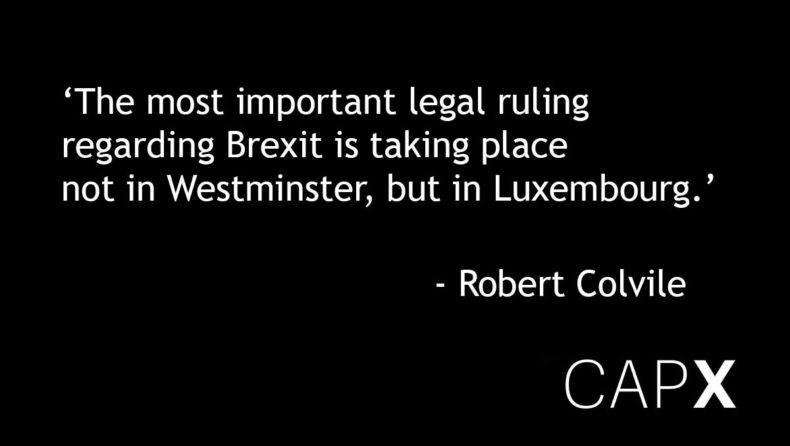The first ruling on Article 50 by the High Court threw British politics into a state of delirium. Hardcore Remainers were dancing in the streets; Brexiteer ultras were fulminating about “unelected judges”; the tabloids were frothing themselves into a frenzy.
So it was with slight embarrassment that I ventured to point out the obvious: that all this was a bit of a storm in a teacup. Whatever the Supreme Court ruled, the parliamentary and political logic was that Article 50 would go ahead.
Yes, there was always an infinitesimal possibility that enough Tories would defect to defeat or significantly amend the motion. But they would be committing political suicide. And it would in any event only be possible if the Labour Party was united against Brexit – which, as on everything else, is very much not the case.
So once Theresa May had offered a vote, the decision today became almost a sideshow. Indeed, whatever the constitutional merits of the ruling (or lack of them), it has left us – as Iain Martin and Fraser Nelson both point out – precisely where we should be. The rights of Parliament have been reasserted. Brexit will proceed, but with parliamentary scrutiny rather than by prime ministerial fiat.

There is a strong case, in fact, that today’s vote leaves Brexit in a better state than before. For alongside its vote on Article 50, the Supreme Court also ruled on the claim by the devolved institutions that they too should get a say on Brexit – that the negotiations had to be signed off not just by Edinburgh but by Holyrood, Cardiff and Stormont too.
And they were told, not so politely, to hop it. In a unanimous decision, the Court ruled that yes, Britain’s devolution arrangements assumed membership of the European Union. But they did not require it. So neither the Northern Ireland Act nor the Sewel Convention gave the devolved legislatures any sort of say over the Brexit vote. Which is something they probably could have worked out without spending tens of thousands of pounds of public money on expensive lawyers.
Yet those Brexiteers who are – rightly – rejoicing over this aspect of the ruling should follow their chain of logic through to the end.
They are happy about the devolved institutions ruling because it means that Nicola Sturgeon and Carwyn Jones (and even, God help us, Gerry Adams) will not be able to hold Brexit hostage.
Instead of having to negotiate in the Welsh interest, and the Scots interest, Theresa May will be able to negotiate solely in the British interest – or, at least, what she sees it as.
But it takes two to make a deal. And on the other side of the table, the situation is very different.
As I pointed out earlier this month, Britain’s exit from Europe – the Article 50 bit – is handled under qualified majority voting. That means it needs the approval of most European heads of state, plus the European Parliament.
But the subsequent deal – the free trade pact that pieces together what Article 50 has torn apart – is a different beast. It is likely to be a “mixed agreement”, meaning that it has to be approved not just by the EU institutions but by every member state, including sub-national parliaments such as the Walloons in Belgium.
As I wrote back then: “In other words, Britain can get its divorce easily enough. But the subsequent settlement – the diplomatic equivalent of splitting up the properties and savings, arranging child support, sorting out custody and visitation rights – can be held hostage by every last Cypriot and Slovak with a grudge.”
The ruling today means that on the British side of the table, the deal will have to be reached by Theresa May and approved by the Parliament in Westminster.
But on the European side, if our deal counts as a mixed agreement, it will need to be approved by a welter of different national and sectional interests, by harried technocrats and swaggering populists, any one of whom could insist on conditions or carve-outs that torpedo the whole thing.
Normally, in a negotiation of one against many, the one can play off the many against each other. But this will be a different situation: one in which dozens of different entities will have a theoretical power of veto, in precisely the way that the Supreme Court has just prevented in the UK.
Yes, Mrs May has made it clear that she is prepared to walk away without a deal. But that is still very much an option of last resort. And the chances of there being an acceptable deal on the table will be greatly increased if we are negotiating with a few key players, rather than a multi-headed hydra.
Which is why, as the headline above points out, the most important legal ruling regarding Brexit is taking place not in Westminster, but in Luxembourg.
For it is there that the European Court of Justice has been considering the seemingly technical question of whether the EU’s free trade deal with Singapore is a “mixed agreement” of precisely the kind we are talking about – setting a precedent for the British deal, too.
Just before Christmas, the Advocate General responsible – by a peculiar coincidence, Britain’s own representative, Eleanor Sharpston – issued an advisory opinion stating that the Singapore deal was indeed a mixed agreement.
Unless the court’s judges disagree with that, which is highly unlikely, a good Brexit deal will be that much harder to strike.
Which leaves Britain in the unfamiliar position of pinning its hopes on the European Court of Justice – and hoping that before we escape their supervision, its members spring one last judicial surprise.


